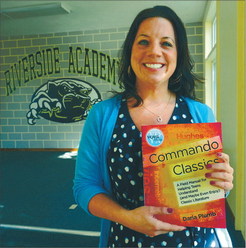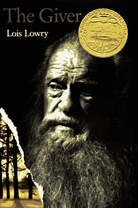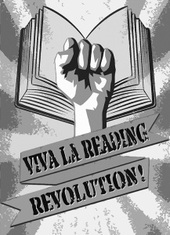
The year starts off with a great guest columnist, Daria Plumb. It would be hard to find someone more dedicated to ALAN and using YA literature in the classroom. I watched her tireless efforts with awe and respect while I served as one of the editors of The ALAN Review.
To introduce her more directly: Daria Plumb has taught language arts and social studies at Riverside Academy (formerly Dundee Alternative High School) in Dundee, Michigan since 1994. Daria actively shares her passion for YA literature and working with reluctant readers. She is active in ALAN (Assembly on Literature for Adolescents of the NCTE) and has presented breakout sessions at the ALAN Workshop, the Monroe County Library System, Eastern Michigan University, MCTE, NCTE, and ChLA. In 2012 she published Commando Classics: A Field Manual for Helping Teens Understand (and Maybe Even Enjoy) Classic Literature for VOYA Press.
Take it away Daria.

I, Daria, graduated from college in 1994. I had great instructors and felt as prepared as I could be to enter my own classroom. I had innovative professors who were talking about things like postcolonial literature, teaching social justice issues, and self-reflective teaching, but nobody was talking about using young adult literature in the secondary classroom. I also didn't encounter it in the local school where I did my pre-student teaching and student teaching, despite the fact the school had created a school-within-a-school program to address the needs of kids who were struggling. In fact, the experience I had with Y.A. lit in college was in an elective children's literature class. And, though I had been an avid reader as a teen, most of my reading consisted of YAP’s (the label given to Y.A. paperbacks in my local library) like Sweet Valley High, Seniors, and other assorted Bantam and Silhouette titles.
When I began teaching at an alternative school in my hometown, I knew that I wanted to expose my kids to literature, but there wasn't much on my radar besides the typical canonical works. The first couple of years, I struggled to find ways to help my students connect to books and stories. They were not good readers themselves and most did not come from families that valued reading. So, teaching The Scarlet Letter, for example, was problematic to say the least. After a few failed attempts of asking students to read quietly at their desks, I began to read the novel out loud, stopping after nearly every sentence to explain what I had just read. Needless to say, it was a slow and arduous process. However, I did find that the kids were interested in the plot of the story even though its language was almost completely inaccessible to them.
Luckily, our program was located in the basement of the local library. One day after school, I went upstairs determined to find something that would engage my students, and I found the section on young adult literature. Two of the first books I read were The Giver by Lois Lowry and Hatchet by Gary Paulsen. Unbeknownst to me, these two books would change my teaching and, ultimately, the entire trajectory of my career.
I was extremely fortunate because my first principal gave me the freedom to figure out my own teaching style and my own curriculum. She was supportive when I asked her to purchase class sets of The Giver and Hatchet. And so my students and I begin a new journey. I still read aloud, but because the books were written in a language the students could understand and the events in the book did not need an explanation, we moved through them quickly and with more comprehension and engagement. Instead of constant explanation, we could spend time talking about the characters and the plot; predicting what might happen next or what we would do if put in the same situation as the protagonist. I asked students to complete final projects on the books that included things like making a collage or drawing a comic book. We were off and running.

Suddenly, my kids were reading books. They were talking about books. They were recommending books to one another. They were figuring out what they wanted to read next. At conferences, their parents said things like, “I don't know what you're doing, but my kid is reading.” Their choices informed my reading; Hailey messaged me on Goodreads and told me that if the next book I read wasn't The Hunger Games, she was going to quit school. Former students still stop in or message me on Goodreads or Facebook to ask for book recommendations or to tell me about what they’re reading. We have even had the privilege of having Y.A. author Patrick Jones do classroom visits for us on two occasions. We became a community of readers, or as one of my boys said, “We are a family of books.”
Through Y.A. books I connected to my students in a better way; I got to know them through their preferences and their interests. Y.A. books gave me a way to talk to my students about issues that don’t often get talked about in classrooms, like suicide, abuse, death, heartbreak, sexual orientation, bullying, etc. Y.A. books changed the way I taught all of my English classes.*
By the time I “discovered” ALAN (Assembly on Literature for Adolescents of the NCTE) in 2005, I knew that young adult literature was a great way to turn kids into readers. What I didn't know was that there was an entire organization of people who knew what I knew and wanted to shout it from the rooftops. Through ALAN I found my professional home. I’ve made connections with people who are more than colleagues; they have become friends and family. Each year, I look forward to the opportunity to meet up with these folks during the weekend prior to Thanksgiving in cities like Pittsburgh, Orlando, Boston, and DC to meet and listen to the authors who are our rock stars and to share ideas and support.
Next year I will have the professional privilege of a lifetime…the opportunity to serve ALAN as its president. It is my role and responsibility to spread the good word about Y.A. literature and to support to those who want to utilize this literature with their teens. Currently, there are too many negative comments in the media about education. It is my goal to remind people that a teacher or librarian, who is armed with the right books and is willing to give kids choice and time to read those books, can in fact change lives. I see it every day. This is why I have chosen “Viva la Reading Revolution!” as my theme for the 2015 workshop. I hope you’ll think about joining us in Minneapolis to join the fight. For more information, please visit http://alan-ya.org/. The deadline for this year's proposals is January 16, 2015.
* As the only English teacher in our school, I do still teach the classics. I believe that they are great stories with universal appeal and I feel it is important for my students to have exposure to and knowledge of certain titles. But, seeing how much better my students respond when a story is accessible to them has changed my teaching approach with those, as well. In 2012, I published a book titled Commando Classics: A Field Manual for Helping Teens Understand (and Maybe Even Enjoy) Classic Literature (VOYA Press) outlining what I do when I’m not teaching a class that is not necessarily heavy in Y.A. lit.

 RSS Feed
RSS Feed